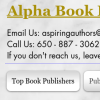-
About
- About Listly
- Community & Support
- Howto
- Chrome Extension
- Bookmarklet
- WordPress Plugin
- Listly Premium
- Privacy
- Terms
- DMCA Copyright
- © 2010-2025 Boomy Labs

 Alpha Book Publisher
Alpha Book Publisher
Listly by Alpha Book Publisher
In the ever-evolving landscape of publishing, ebook tools are playing a pivotal role in shaping the future of reading. With the rise of digital formats, these tools offer authors and publishers the ability to create, distribute, and market their works more efficiently than ever before. From design software to distribution platforms, these tools are revolutionizing how books are produced and consumed, opening up new possibilities for both creators and readers alike. This shift marks a significant transformation in the way literature is produced, accessed, and enjoyed in the digital age.Learn More: http://tools.ebookpublishing.site/ToolsEbookPublishing.html
Source: http://tools.ebookpublishing.site/ToolsEbookPublishing.html
The digital revolution has transformed the way we consume content, and nowhere is this more evident than in the world of publishing. With the rise of ebooks, readers now have access to a vast array of literature at their fingertips. But what role do tools ebook publishing play in shaping the future of reading? Let's delve into this intriguing question.
Ebook publishing tools have democratized the publishing process, allowing authors to bring their stories to life with ease. From formatting software to cover design tools, these resources empower writers to self-publish their work and reach a global audience. By eliminating the barriers to entry, ebook publishing tools have opened the door to a new era of literary creativity.
One of the key advantages of ebook publishing tools is the ability to customize and personalize the reading experience. Readers can adjust font sizes, choose their preferred reading layout, and even access interactive features such as annotations and multimedia content. This level of customization not only enhances the reading experience but also allows publishers to cater to the diverse preferences of their audience.
Ebook publishing tools have made literature more accessible and affordable than ever before. With digital distribution channels, readers can purchase and download books instantaneously, eliminating the need for physical copies. Additionally, ebooks are often priced lower than their print counterparts, making them an attractive option for budget-conscious readers. This increased accessibility has democratized access to literature, allowing readers from all walks of life to discover new authors and genres.
The evolution of ebook publishing tools has sparked a wave of innovation and experimentation in storytelling. From interactive fiction to immersive multimedia experiences, authors are pushing the boundaries of traditional narratives. With tools such as e-book creation software and digital publishing platforms, writers have the freedom to explore new mediums and formats, captivating readers in new and exciting ways.
In the digital age, ebook publishing tools have enabled authors to transcend geographical boundaries, reaching readers in every corner of the globe. This global reach not only broadens the audience for writers but also fosters cultural exchange and understanding as diverse stories find their way into the hands of readers worldwide.
Ebook publishing tools provide valuable insights into reader behavior and preferences through analytics. Publishers can analyze data on reading habits, engagement metrics, and market trends to inform their decision-making process. By leveraging these insights, they can tailor their content strategies, optimize marketing efforts, and ultimately enhance the success of their publications.
Ebook publishing tools facilitate collaboration between authors, editors, designers, and other industry professionals, streamlining the production process. Cloud-based platforms enable real-time collaboration and feedback, allowing teams to work seamlessly regardless of their location. This collaborative approach fosters innovation and ensures that the final product meets the highest standards of quality.
With the advancement of ebook publishing tools, the definition of literature is expanding to include multimedia elements such as audio, video, and interactive graphics. This multimodal approach not only enriches the reading experience but also opens up new creative possibilities for storytellers. As ebooks evolve into immersive multimedia experiences, the distinction between literature and other art forms becomes increasingly blurred.
As digital publishing continues to evolve, ethical considerations regarding copyright, distribution, and content ownership become increasingly important. Ebook publishing tools must balance the interests of authors, publishers, and readers while respecting intellectual property rights. Additionally, issues such as digital piracy and DRM (Digital Rights Management) pose challenges that require innovative solutions to ensure fair compensation for creators and sustainable growth for the industry.
